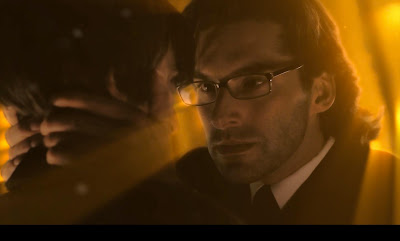 |
| Ricky (Michelle Hendley) in Boy Meets Girl. |
Gender fender
By Don Simpson
Being born with male genitalia did not stop Ricky (Michelle Hendley) from evolving into a strong and beautiful young woman; but despite her courageousness, living a transgendered life in a quaint, backwoods Virginian town, Ricky still lacks the confidence to enter the dating scene as an unabashed woman. Ricky’s best friend, Robby (Michael Welch), remains faithfully at her side, as she flounders around aimlessly. Anyone who meets Ricky and Robby immediately suspects that Robby is just observing from the sidelines, in the hopes that Ricky will one day be ready to date him. Meanwhile, Ricky sees fashion school in New York City as her one key to escaping the mind-numbing monotony of small town life. At the very least, New York City is certain to have a more open-minded dating pool for Ricky to peruse.
Enter Francesca (Alexandra Turshen), the fiancé of a socially conservative Marine and daughter of wealthy Tea Partying parents. Ricky and Francesca are both taken aback by the magnetic chemistry they unexpectedly share. Since Ricky still has a functioning penis, they are able to enjoy heterosexual intercourse, but everything else about their relationship seems as if they are two women hopelessly smitten with each other. Needless to say, it is a confusing relationship for everyone — including Ricky and Francesca — to understand. When it comes down to it, their connection is in no way related to their respective genders. It might sound a bit cheesy, but Ricky and Francesca are trying to listen to their hearts and nothing else.
Writer-director Eric Schaeffer’s Boy Meets Girl is about developing enough self-confidence to not care about what anyone else thinks; to be one’s true self and not what everyone wants you to be; to feel accepted and loved despite any perceived eccentricities or warts. Eschewing the crippling term “normal” and admirably avoiding presenting Ricky as an “Other,” Schaeffer’s film speaks to the importance of tossing aside the labels that inherently alienate human beings.
A rare feat for an outsider, Schaeffer seems to capture the life of a transgender woman with profound authenticity and positivity. Hendley masters the role of Ricky as if it was her own story. One can only assume that Hendley and other transgender women collaborated in the development of the script, as many moments seem far too honest to have been penned by someone who did not experience these situations firsthand.
But Boy Meets Girl is not strictly a transgender or LGBTQA film, it is a film about understanding and acceptance, universal themes that clearly transcend gender and sexual orientation. Deeply exploring issues of shame, judgment and hatred in the context of the ever-blurring lines of gender, Schaeffer still finds a way to make a film that is significantly more lighthearted and funny than his films Fall and After Fall, Winter. Not to be confused with Leos Carax’s Boy Meets Girl, which operates in sharp tonal contrast to the lighthearted rom-com genre that the title suggests, Schaeffer fully embraces the tone and structure of the rom-com genre to make his intellectually intuitive plot all the more digestible. Essentially a teen chick flick with balls (mind the pun), Schaeffer’s film is infinitely more thoughtful than most (all) other films in the genre.




